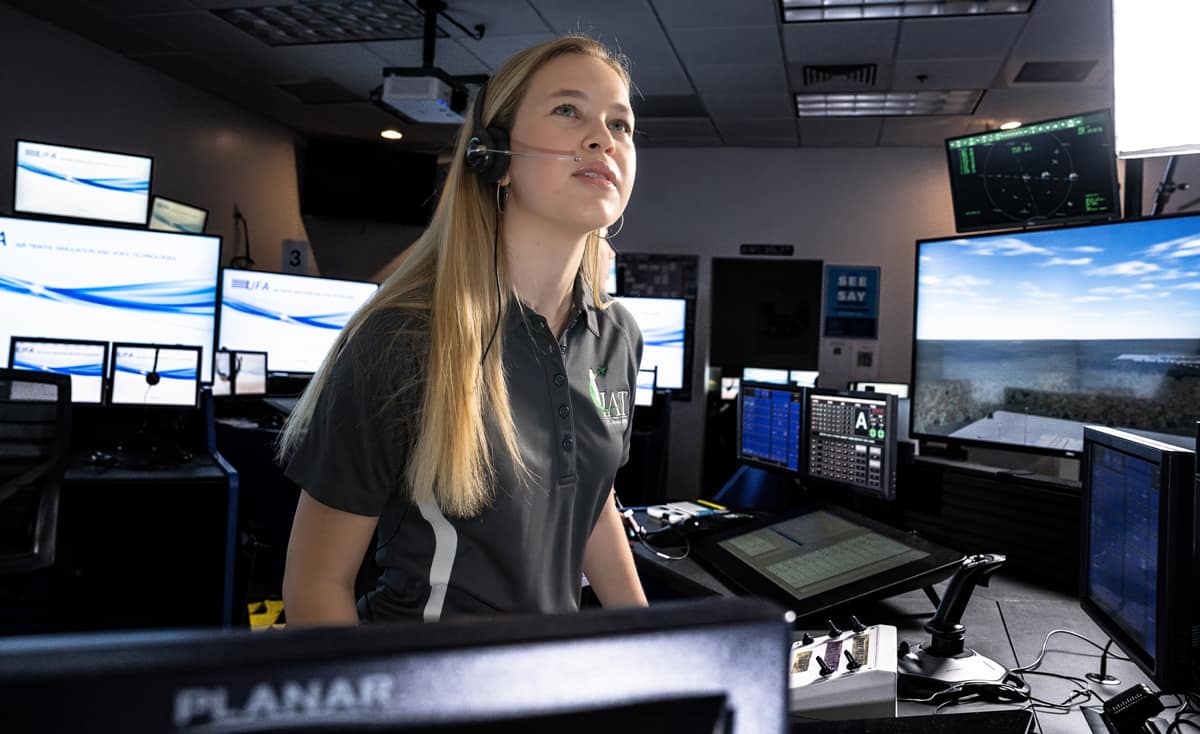Embry-Riddle Introduces Air Traffic Management Associate Degree Program to Strengthen Controller Workforce

To increase the air traffic controller pipeline, Embry-Riddle Aeronautical University has launched a pioneering associate degree program that provides an accelerated hiring path for students seeking rewarding careers in safeguarding the nation’s air traffic system.
The new Associate of Science in Air Traffic Management program — set to debut in August 2025 — has been approved to be part of the Federal Aviation Administration’s Enhanced Air Traffic Controller Training Initiative (AT-CTI).
The Enhanced AT-CTI program allows students to bypass training at the FAA’s academy in Oklahoma City, Oklahoma, and proceed directly to facilities for on-the-job training, provided they pass the same rigorous written and simulator evaluations upon earning their Embry-Riddle degrees.
Embry-Riddle’s new associate degree program is in addition to the university’s Bachelor of Science in Air Traffic Management, which was approved for the FAA training initiative late last year and has already produced its first graduates.
The two-year associate degree program is currently focused on Tower training, whereas Embry-Riddle’s four-year bachelor’s degree program combines En Route and Terminal operations, which includes Tower training.
The FAA has approved the associate degree program for its Terminal Tower track through the Enhanced AT-CTI program. Students must also pass the Air Traffic Skills Assessment (ATSA) exam and meet the medical and security requirements to fulfill the requirements of the Enhanced AT-CTI program.
“This unique program will prepare students to be safe and effective air traffic controllers at a critical time for aviation,” said Embry-Riddle President P. Barry Butler, Ph.D. “Embry-Riddle is proud that this new associate degree program will provide an additional avenue to get well-trained controllers into the workforce now and for years to come.”
Based in the Department of Applied Aviation Sciences on the Daytona Beach Campus, the associate degree program offers a high-level curriculum adapted from Embry-Riddle’s Bachelor of Science in Air Traffic Management (ATM). The program’s expert faculty, with over 150 years of experience in air traffic control, will serve as instructors, and students will train on Embry-Riddle’s cutting-edge simulators in the university’s air traffic control labs. These advanced systems feature dynamic, immersive air traffic technology, including AI-assisted voice recognition and high-fidelity visualizations.
“Our Air Traffic Management graduates set the gold standard for reliability, safety and excellence,” said Dr. Alan Stolzer, dean of the College of Aviation on the Daytona Beach Campus. “This program will maintain that same standard for excellence when educating these students to serve in our nation’s air traffic control facilities.”
In an effort to boost the air traffic control workforce, U.S. Transportation Secretary Sean P. Duffy has announced a supercharged hiring campaign for air traffic controllers — a campaign that is expected to continue over the next several years. The profession is well-compensated, with a median salary for air traffic controllers at nearly $145,000, according to the Bureau of Labor Statistics. According to the FAA, the average certified professional controller makes over $160,000 per year.
The supercharged hiring campaign will “allow more of the best and brightest candidates to get into air traffic facilities sooner and on the job faster,” according to a Department of Transportation news release.
“Air traffic control is an exciting, dynamic and lucrative profession, said Dr. Mike McCormick, associate professor and Air Traffic Management program coordinator. “The field attracts outstanding students who want to serve and safeguard pilots, crew and the flying public while having meaningful careers.”
